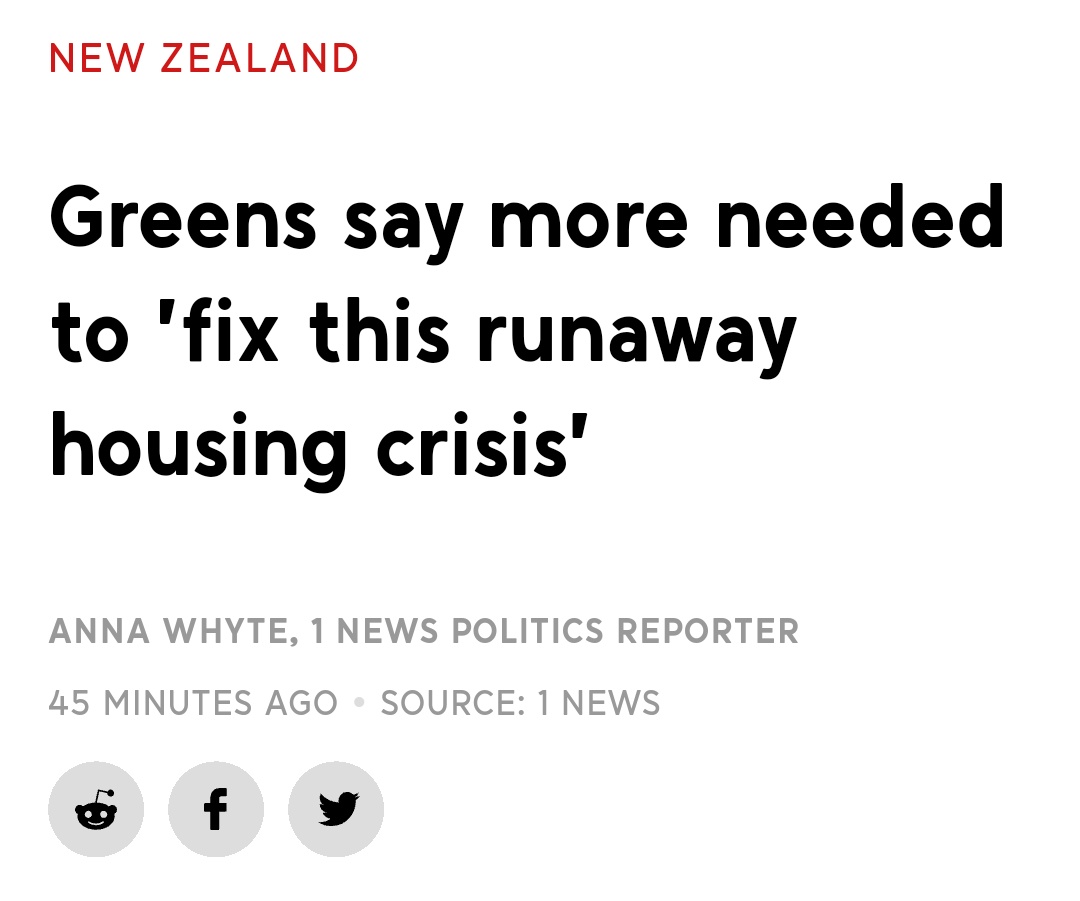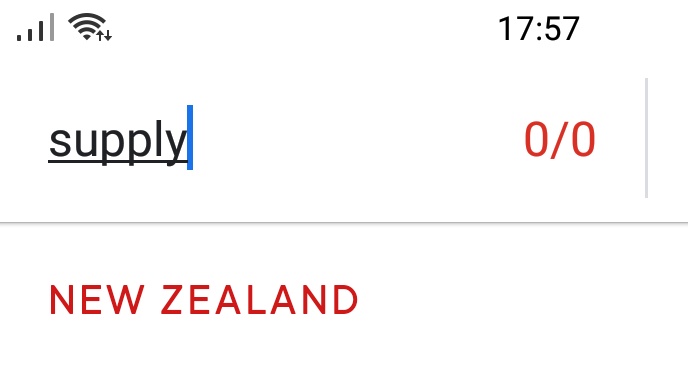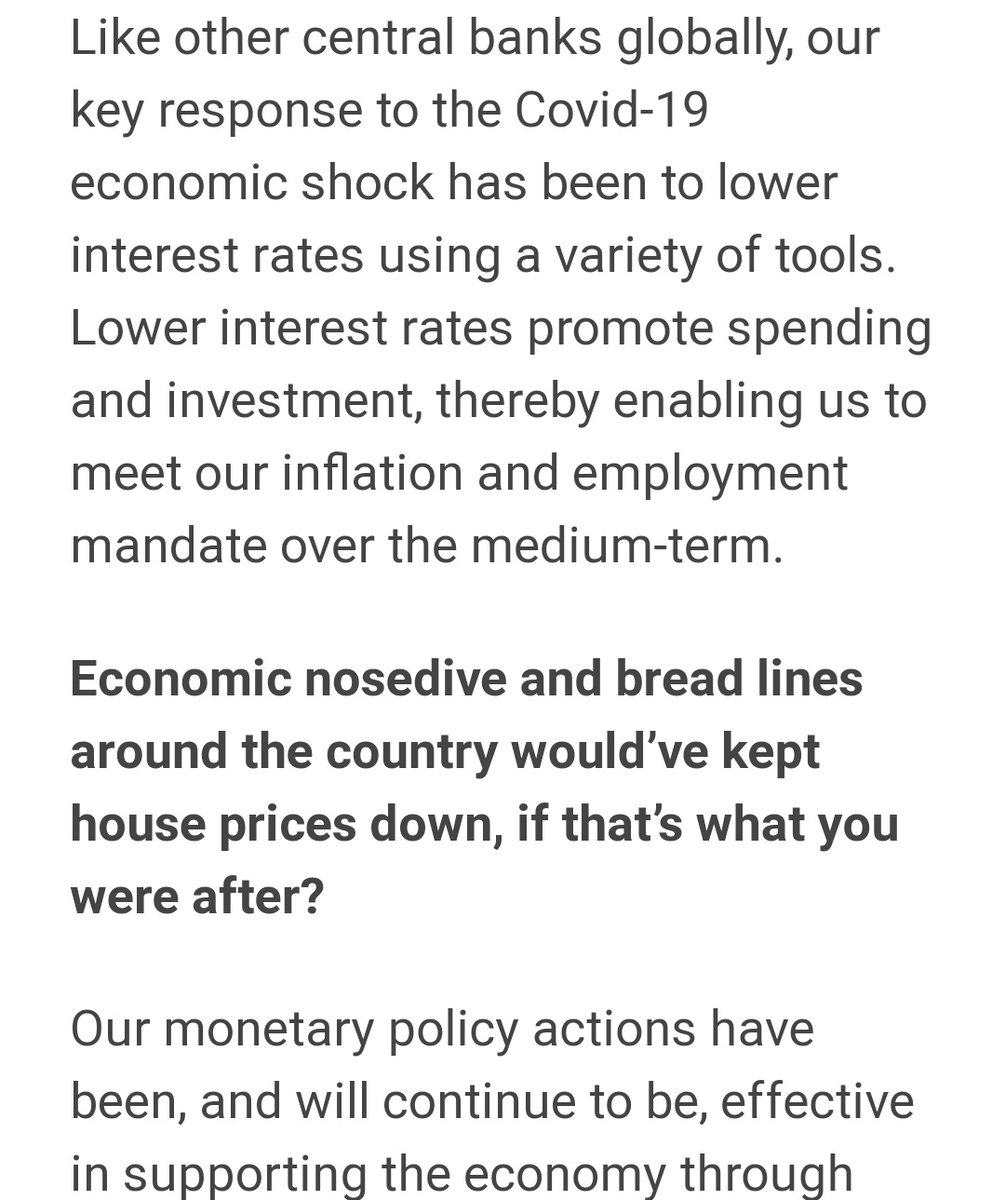Grant Robertson today asked the Reserve Bank to factor in house prices.
What that means is that the Govt has asked the Reserve Bank to increase unemployment to lower house prices.
Terrible situation. https://twitter.com/Economissive/status/1326604488522625024
What that means is that the Govt has asked the Reserve Bank to increase unemployment to lower house prices.
Terrible situation. https://twitter.com/Economissive/status/1326604488522625024
National, ACT and Labour all trying to claim credit for this disastrous decision.
Shamubeel Eaqub on @CheckpointRNZ is an economic fraud.
Shamubeel Eaqub on @CheckpointRNZ is an economic fraud.
Robertson claiming his solution's (changing monetary policy's aim) better than National's (changing LVRs, I think), but National's seemed less bad to me.
Eaqub said the Reserve Bank 'can blame no one but itself' for the price increase. Eaqub is a fraud. https://twitter.com/Economissive/status/1329930607632076801?s=19
Thank fck someone's got their head screwed on https://twitter.com/bernardchickey/status/1331089217267482624?s=19
Seymour's comment in this story is insane. But even the Genter's comment is wrong.
Incredible political failure across the board https://twitter.com/_chloeswarbrick/status/1331095202287652870?s=19
Incredible political failure across the board https://twitter.com/_chloeswarbrick/status/1331095202287652870?s=19
It's ok everybody. The Minister of Finance only asked the Reserve Bank to consider increasing unemployment to reduce house prices. He didn't break the law by directing them to. https://twitter.com/policyprogress1/status/1331107712826916866
Hi @grantrobertson1 - what were you thinking asking the RB to consider increasing unemployment as a solution to house prices and when will you be offering your resignation?
Robertson said he 'rejected' the idea that The Reserve Bank increasing interest rates to bring down house prices would cause unemployment.
He can reject it, but he's wrong.
He can reject it, but he's wrong.
He said unemployment/inflation would remain the primary target. Sure. But when you introduce another target that moves in the opposite direction (jobs go down with falling interest rates, house prices go up), then you do as @CorinDann said reduce the focus on unemployment.
It's unambiguous. If the Reserve Bank adopts the Govt's request, unemployment will go up.
Robertson certainly knows this but was happy to reject the idea to the public.
Steven Joyce is the Finance Minister who didn't understand how to read accounting statements and imagined a fiscal hole
Grant Robertson is the Finance Minister who asked the Reserve Bank about increasing unemployment to reduce house prices
Grant Robertson is the Finance Minister who asked the Reserve Bank about increasing unemployment to reduce house prices
Dann: "What would happen if you did have to place more weight on housing? Because some economists argue that if you had had to put greater weight on asset prices and housing during this crisis, then unemployment would be higher"
Orr: "That's correct" https://www.rnz.co.nz/national/programmes/morningreport/audio/2018774440/nz-economy-looking-good-but-still-could-be-hit-by-covid-19-shock-adrian-orr
Orr: "That's correct" https://www.rnz.co.nz/national/programmes/morningreport/audio/2018774440/nz-economy-looking-good-but-still-could-be-hit-by-covid-19-shock-adrian-orr
People wanting the Reserve Bank to have options to limit house price increases, this is what you end up with: things like debt-to-income limits that stop low income people buying at all. https://www.rnz.co.nz/news/business/431487/adrian-orr-says-reserve-bank-wants-to-introduce-debt-to-income-ratios-to-nz
Gyles Beckford putting everyone in their place https://twitter.com/TheDetailNZ/status/1330920412012830724
Eaqub is being so dumb it's hard to know where to begin https://twitter.com/SEaqub/status/1332133025841258496
CPI is specifically designed to inform monetary policy and monetary policy is about stability in prices of *consumption* goods and making sure the economy is growing at a good rate (that unemployment is low)
Monetary policy is *not* about limiting increases in the value of non-consumption goods (investment assets like land, labour, and captal). because that would limit economic growth.
Contrary to Eaqub, changes in the price of *housing* are included in the CPI (changes in the costs of new builds).
What's not included is changes in the price of *land*. Because it's not a good that's consumed. It's existed. It'll always exist. No changes in monetary policy will affect its levels of production and consumption.
It's an investment asset like labour and other forms of capital.
People consume houses. They do not consume land.
And what's going up in price? It's not actually houses. It's the land prices that are going up.
And what's going up in price? It's not actually houses. It's the land prices that are going up.
Next, think about what would happen if Eaqub's "house prices" were included...
The economy certainly isn't at full employment right? But his inflation is above the Government's target, so the Reserve Bank would increase interest rates and unemployment (taking us back to the start of this thread).
So, something's not right here immediately. You don't solve the problem of people being unable to afford houses because house prices are high to making people unable to afford houses because they are unemployed.
So what does adding it to CPI add?
Remember, CPI has been specifically designed to help the Reserve Bank guide the economy back to full employment.
Remember, CPI has been specifically designed to help the Reserve Bank guide the economy back to full employment.
It adds nothing to that purpose. In fact, it undermines that purpose.
If "housing" was added, we'd have to change the target range for inflation so that it better matched where inflation would be at full employment. And we'd have to constant change it whenever there are supply restrictions in the market and when there aren't!
When supply restrictions on housing aren't an issue, we'd be back at the 1% to 3% target. And when supply restrictions on housing are an issue, we'd have something much higher...
...but because the housing part would be totally unpredictable (when inflation is high, it's unpredictable - look at the 20% increase!), the Reserve Bank would focus back on the 1% to 3% to try to make sense of anything.
This is embarrassing by Eaqub.
Both he and Robertson have effectively asked the Reserve Bank to consider increasing unemployment to reduce house prices.
Both he and Robertson have effectively asked the Reserve Bank to consider increasing unemployment to reduce house prices.
And now Eaqub is suggesting that we change the measure of CPI to be much much worse for setting monetary policy and getting back to full employment.
Absolute sham of an economist.
Absolute sham of an economist.
Gyles Beckford, in his understated way, absolutely wrecked Eaqub on The Detail.
Highly recommended. https://twitter.com/TheDetailNZ/status/1330920412012830724
Highly recommended. https://twitter.com/TheDetailNZ/status/1330920412012830724
Eaqub is frequently hired by this Government.
An economist might wonder what incentives an economist faces when they blame the Reserve Bank for what are quite clearly Government failures. https://twitter.com/Economissive/status/1329930607632076801
An economist might wonder what incentives an economist faces when they blame the Reserve Bank for what are quite clearly Government failures. https://twitter.com/Economissive/status/1329930607632076801
Or is it just the typical 'economist says outlandishly wrong thing to get media attention and people to pay him to give talks at their annual meeting'?
I mean, let's go back to one of the Reserve Bank's core objectives. I emphasise the unemployment on because it's of greatest importance, but let's look at the inflation one.
It's about stability in *general* prices. Not stability in relative prices. Some prices ARE meant to go up relative to others from time to time...
Price rises in housing (or anything) are a signal to the economy to build more of them and, when the economy can't, for the Government to fix whatever the constraints are stopping the economy from building them.
Eaqub is asking the Reserve Bank to squash prices for particular parts of the economy and thereby discouraging both the economy and Government from doing something about the problem.
The Reserve Bank is meant to look through one-off price changes at the general change. The housing market is a series of persistent one-off price increases because the Government refuses to do anything about it - the only market that is prevented by Government from adjusting

 Read on Twitter
Read on Twitter





